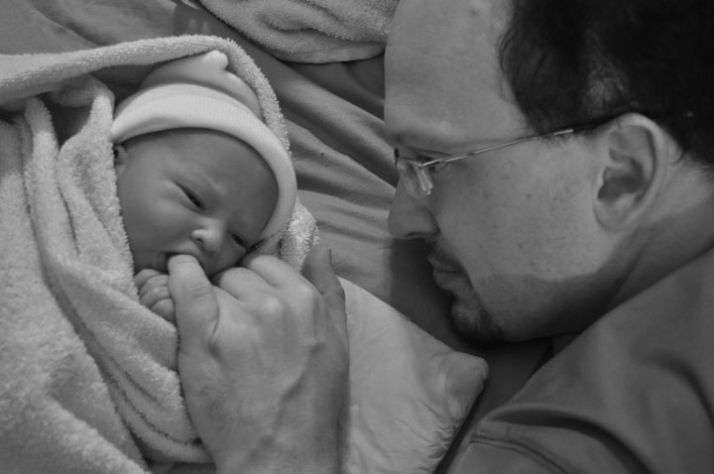I’m the father of seven children. My wife is a midwife, but she wasn’t when we first started our parenting journey. We’ve had five hospital births and two home births, all vaginal births, some with epidurals and some without. My wife was induced in the hospital with Pitocin a couple of times, but most of the time she ended up having a baby in her own time. My oldest son is now 21. He was born in the hospital because there was no way I was going to do a home birth. My youngest, and only girl, is 9 and she was born at home because there was no way I was going to do a hospital birth. What changed between my first and my last? A lot.
When my wife announced she was pregnant with our first I was happy, scared and completely clueless. All I knew was that hospitals were where you went to have babies and that meant that’s where we were going to go. I wouldn’t even consider a home birth, that was crazy. What if something went wrong? Why would I pay to have a baby outside of the hospital when my insurance would pay for it? What did I learn during that pregnancy? Well, first I learned that doctors are always late, they think they are really smart, a baby is something to be delivered and in reality, you don’t see your doctor very much either during your pregnancy or at the birth unless something goes wrong. I also learned that the childbirth education class I took, didn’t really prepare me to help my wife out all that much and the doctor didn’t really have any interest in helping us preparem their job was the delivery. I also learned that my wife has pretty fast labors when not induced, and that she was incredibly strong. Even in the hospital she went drug free
With our second and third I learned that if you’re high risk then the hospital’s the right place for you. After a car accident and a gall bladder removal we decided it was best to continue with numbers two and three in the hospital. I also learned that Pitocin contractions suck. My wife was in way more pain, the contractions were way worse then natural ones, and that inductions take way longer. I also learned that epidurals are a blessing when it comes to Pitocin inductions. Furthermore, I learned that you spend a lot more time in the hospital, hospital couches suck and while I love nurses, being woken up by them every couple of hours is awful.
My fourth was our first home birth. My wife had been a practicing midwife and finally convinced me that it was safe and I finally decided to listen to what she was saing. It was an amazing experience and made me wish I’d reconsidered our first birth. The midwife was great. She was patient and gave us a lot of information and tools to assist in pregnancy. She had lots of tips and tricks and comfort measures during the birth. My wife didn’t have to worry about being hooked up to a monitor constantly or being told to be in a particular position for labor. She could eat and drink through labor to keep her strength and hydration up. Her recovery was quicker, her labor was more peaceful, the baby was more alert, and we didn’t have to worry about a nurse waking us up every couple of hours. The baby slept next to us and we woke when he did.


SHARE THIS ARTICLE